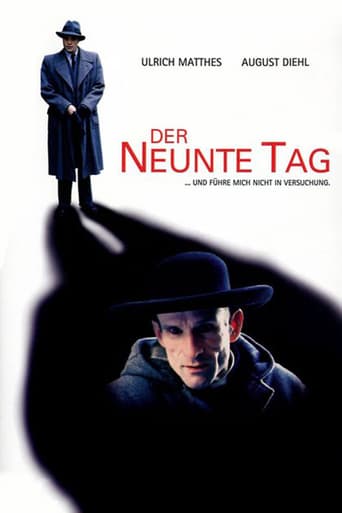Morten Engelsmann
At the time of the WWII, Europe witnessed a great battle of values, beliefs, ideologies - call it what you want. Almost all roles in the movie are same sex, that is they are male, reflecting brutality and focusing the spectator on the great battle of values - here's no room for romance and no place for comedy, it's all about changing the world, and about survival. Every scene is a grand battle of values.
ma-cortes
During WW2 a priest named Henry Kremer(Ulrich Matthes) imprisoned in concentration camp of Dachau is freed along a period of 9 days. He's threatened by a SS Unterstumfuhrer(August Dhiel) to convince the Luxemburg bishop(Tathe) to write a declaration for supporting the Nazi regime . The priest is affected because of his decision whether or not to collaborate with the Nazis.This is an intelligent and thought-provoking film , correctly based on real events. The director covers a wide variety of plot developments at a rare pace by means of continuous flashbacks in which remembers horrible events at concentration camp of Duchau. Excellent performances by main cast as Ulrich Matthes (Goebbles in ¨The downfall¨) and August Dhiel(Ingorious bastards). Good secondary cast as Bibiana Beglau (Legend of Rita by Schlondorff) as the affecting sister . The musical score is often despairing and screeching with surprising witty touches , it is composed by Russian musician Alfred Schnitke(1934-88). The motion picture is well directed by Volker Scholondorff. He's an expert on Nazi issues as proved in ¨Tim drum¨ , ¨The ogre¨ and this one. Schlondorff does a very unusual pictures with important insight into how the past affects the present and root causes of war. His first feature film, ¨Young Torless¨ was showed around the world and he was pretty heard by international viewers when directed ¨The lost honour of Katharine Blum¨, getting similar success his fellow-countrymen as Fassbinder, Herzog and Wenders. His reputation was greatly enhanced when his phenomenal movie ¨Tin drum¨ was awarded the Oscar as best foreign-language film. Later on,Schlondorff consolidated with ¨Circle of deceits¨. Since then his films have been less satisfactory as ¨Murder in the Bayou¨ , ¨Handmaid's tale¨and ¨Palmetto¨.Rating : Very good , Schlondorff's one the last impressive film to date. The film is admirable coherent , though in complicated narrative and never sags under its approx. hundred minutes . The movie will appeal to Nazi theme buffs
Jiri Severa
**** may contain spoilers ******I am not surprised nor offended that some reviewers find the Ninth Day a Catholic propaganda and Ullrich Matthes' silences a witness to his lack of Thespian credentials. Quite the contrary, such comments confirm that the movie, and the basis of morality which it examines, is not intellectually available or esthetically pleasing to simple-minded people. That in itself marks its quality.There are some absolutely gripping moments in the Schloendorff's masterpiece: the mocking of the Polish priest before he is hoisted on the cross (he was not "crucified" - that just would not capture the horrific sadism in the act - the movie makes a point in altering the method of using the cross by a Dachau commandant), the reading by Gebhardt of Kremer's human weakness and sense of inferiority (the offering of the chocolates after Kremer contemptuously refuses a cigarette was a devilish coup - Kremer tries to justify his defeat by offering the sweet to an unknown little girl), Gebhardt's theory of "Judas" as the most pious Christian, his cool reception of Kremer's volcanic "noli venire inter Domine et me", Gebhardt's contempt for the cowardice of Kremer's brother ("you were right, the eggs are excellent")...no, this is no Catholic propaganda, on the contrary, the body of Christ failed Kremer by signing the Concordat with the Antichrist, in his search for the vindication of his faith he is alone, ...this has all the markings of a great classic: ingenious, complex, haunting, obsessional, true.
Nirankush Mukherjee
This movie has been unduly panned by IMDb critics as being Catholic propaganda, when there is hardly any. It's actually an exploration of questions on faith and morality, viewed from the perspective of Rev. Henri Kremer, a priest who has been "on leave" from Dachau to convince the Bishop of Luxemburg to support Nazism, who has been a silent opponent all throughout. At one point the film even mentions that the Pope however congratulated Hitler on his birthday - that clearly indicates the acquiescence of the Catholic world - to me that's quite the opposite of propaganda.**** SOME SPOILERS AHEAD **** The movie chronicles each of the 9 days that Rev. Kremer is allowed, and his conversations with Gestapo officer Gebhardt. When Kremer fails to convince the Bishop, he is persuaded to write a memo himself, given his own respectability due to his family status. In return he can have all the priests in Dachau released. Kremer at one point thinks he is being like Judas betraying the Christian cause (also to be noted that his personal cash upon release amounted to 30 marks), which Gebhardt, a former theology student himself, argues is a necessary evil, because without Judas there would be no martyrdom of Christ, and hence no Christianity. Rev. Kremer also learns that by giving Nazi policies the official blessing of Catholicism, he can be responsible for the deportation of thousands - although some 40 priests could be let go from Dachau. The resulting dilemma of Kremer dominates the movie.Ulrich Matthes is very convincing in the role of Kremer with his sunken cheeks and eyes, and watch the young actor August Diehl in the role of Untersturmfuehrer Gebhardt.



